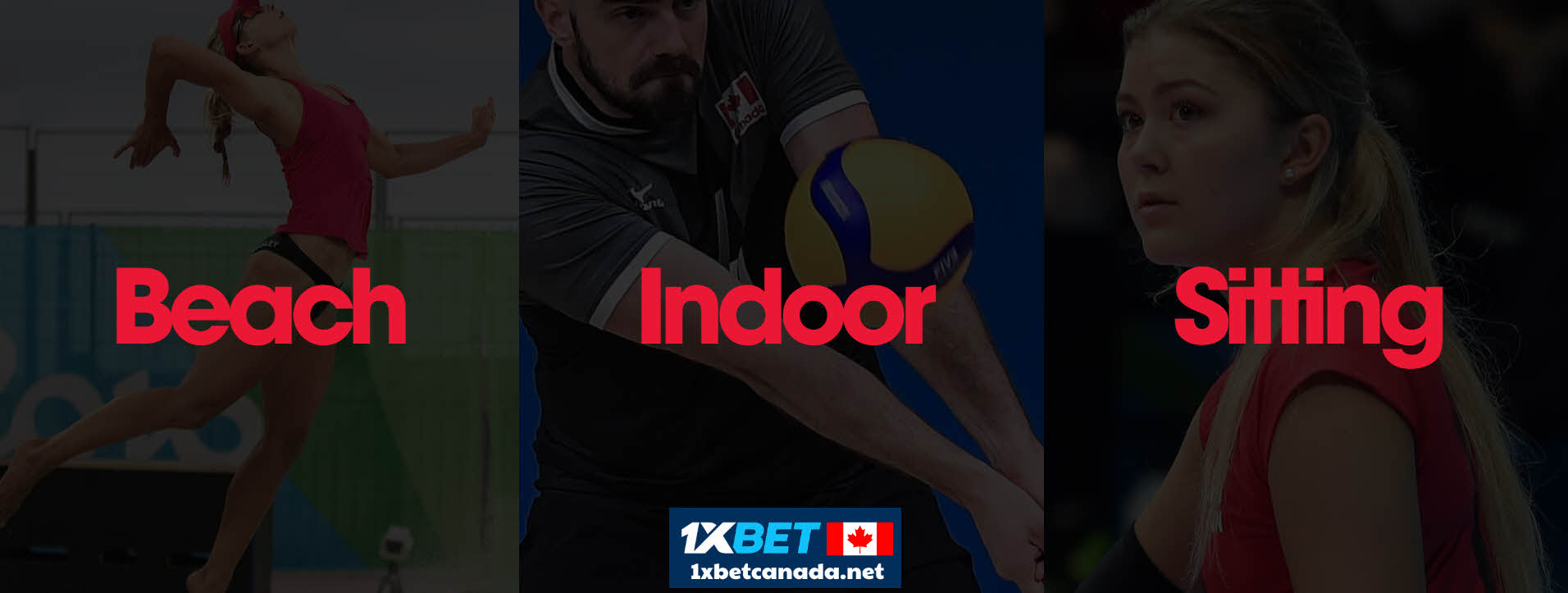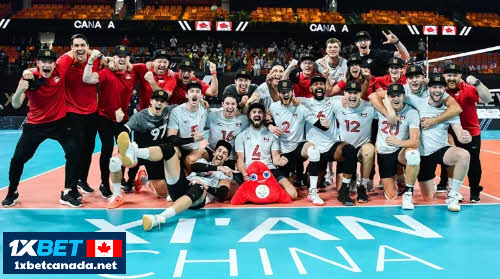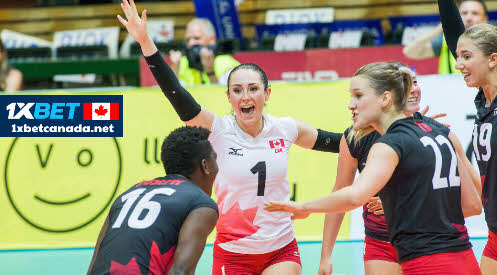Volleyball Canada continues to foster growth and excellence in the sport, nurturing talents for both indoor and beach volleyball. This dedication is evident in the structured development of player positions and the strategic approach to the game, ensuring that athletes are well-prepared for both national and international competitions. 1xbet helps you understand more about this subject and information about Canada’s national volleyball teams.
A Comprehensive Overview Volleyball
Volleyball is a dynamic team sport where two squads of six players each are divided by a net, vying to score by grounding the ball on the opponent’s side under structured regulations. Recognized in the Summer Olympic Games since Tokyo 1964, the sport also features beach volleyball, introduced at the Atlanta 1996 Summer Olympics. The adapted version for the Summer Paralympic Games is sitting volleyball.
The rules of volleyball are detailed, yet the fundamental gameplay can be summarized: a rally begins when a player serves the ball from behind the back boundary line over the net into the opposing team’s court. The receiving team must prevent the ball from touching the ground within their court, allowed up to three touches to return it. However, individual players cannot hit the ball twice consecutively. Typically, the initial touches set up an attack, an effort to send the ball back over the net in a manner that makes it difficult for the opposing team to continue the rally, thus scoring a point.
Points are awarded to the team that wins the rally, who then serves to initiate the next one. Common faults include:
- The ball landing outside the opponents’ court or not crossing the net
- Catching and throwing the ball
- Double hits by a single player
- Four consecutive contacts by one team
- Touching the net during play
- Foot faults, such as crossing the boundary line while serving or stepping under the net while keeping the ball in play
Although primarily played with hands or arms, any part of the body can legally contact the ball. Volleyball has evolved to include consistent techniques such as spiking and blocking—plays executed above the net, necessitating strong vertical jumps. Key skills in the game include passing, setting, and understanding specialized volleyball positions, which form the core of both offensive and defensive strategies.
Variations and Related Games of Volleyball
Volleyball’s fundamental rules have inspired numerous variations, with beach volleyball being the most notable. Played on sand with two players per team, beach volleyball rivals the traditional indoor version in popularity.

Other volleyball-related games include:
- Crossnet: A unique blend of volleyball and foursquare, played in a four-way format.
- 9-man: Originating from Chinese immigrants in the United States during the 1930s, this variant remains popular in Asian communities and North America. It has cultural significance, documented in a 2014 award-winning film and a 2017 YouTube documentary.
- Beachball volleyball: An indoor game using a beach ball instead of a standard volleyball.
- Biribol: An aquatic version played in shallow pools, named after its Brazilian city of origin, Birigui. It shares similarities with water volleyball.
- Ecua-volley: A variant from Ecuador with notable differences, such as player count and a heavier ball.
- Footvolley: A Brazilian sport where hands and arms are off-limits, but otherwise similar to beach volleyball.
- Handball: Teams use their hands to throw a ball into a goal.
- Hooverball: Popularized by President Herbert Hoover, this game uses a volleyball net and a medicine ball, scored like tennis but caught and thrown back. It demands physical endurance, with annual championships in West Branch, Iowa.
- Newcomb ball: Players catch and throw the ball instead of hitting it, rivaling volleyball in popularity until the 1920s.
- Prisoner Ball: A variation of Newcomb ball where players are “imprisoned” or released instead of scoring points, often played by children.
- Sepak Takraw: Popular in Southeast Asia, it uses a rattan ball and allows only feet, knees, chests, and heads to contact the ball.
- Snow volleyball: A winter variant of beach volleyball played on snow. The Fédération Internationale de Volleyball aims to include it in future Winter Olympic Games.
- Throwball: Gained popularity among female players at the YMCA College of Physical Education in Chennai, India, in the 1940s.
- Towel volleyball: An outdoor game where players work in pairs, holding towels to throw the ball into the opponent’s court, with variations using blankets held by four people.
- Volley squash: Played within a squash court or similar enclosed space.
- Wallyball: A variation using a rubber ball in a racquetball court.
Volleyball Canada’s influence extends beyond traditional formats, fostering these diverse adaptations and ensuring the sport’s continued growth and enjoyment across various settings.
National Volleyball Teams In Canada
Canada Men’s National Volleyball Team

The Canada men’s national volleyball team, under the governance of Volleyball Canada, competes on the global stage in various international volleyball events. This team has a storied history, marked by significant accomplishments. Notably, they secured fourth place at the 1984 Olympic Games in Los Angeles and won bronze medals at the Pan American Games in 1979, 1999, and 2015. Their Olympic journey includes participation in four Games, with a remarkable fifth-place finish at Rio 2016, ending a 25-year hiatus.
Canada hosted the 2015 Pan American Games in Toronto, where the team triumphed over Puerto Rico to claim the bronze medal. In the same year, Canada made a notable appearance at the FIVB Volleyball Men’s World Cup, their first in 12 years, finishing seventh, a position they had also held in 2003. The team continued to demonstrate their prowess with a joint-seventh-place finish at the 2014 FIVB Volleyball Men’s World Championship.
Transition and New Leadership (2017–present)
Following Glenn Hoag’s retirement, Stephane Antiga took over as head coach, ushering in a new era for the team. In the 2017 World League, Canada showcased a younger roster, featuring emerging talents like Ryley Barnes and Sharone Vernon-Evans. Despite the absence of several veteran players, the team performed admirably. They began the tournament strongly, defeating Belgium and the USA, the reigning Olympic bronze medalists, in five sets, while narrowly losing to Serbia.
The second week saw Canada securing three points against Bulgaria, though they faced defeats in their other matches. In the final week, victories over Belgium and Italy earned them five points, placing them fifth overall and securing a spot in the final round. Canada faced Brazil in their first match of the final round but bounced back with a straight-sets victory over Russia, advancing to the semi-finals.
In the semi-finals, Canada encountered France and fell in four sets. However, they rallied in the bronze medal match against the USA, overcoming an initial set loss to win three consecutive sets and claim their first-ever World League medal. Graham Vigrass and Blair Bann were recognized as tournament all-stars, highlighting Canada’s impressive performance.
Canada Women’s National Volleyball Team

The Canada women’s national volleyball team actively competes in international tournaments and exhibition matches. Overseen by Volleyball Canada, the team’s mission is to excel on the global stage through a structured and rigorous development program.
The Senior Women’s A National Team Program is dedicated to identifying, selecting, and training athletes who exhibit exceptional skill and international experience. This program aims to prepare a formidable group of players capable of representing Canada at the highest levels of competition. Through intensive training and strategic development, Volleyball Canada ensures that these athletes are equipped to compete with the best in the world, thereby enhancing the country’s reputation in women’s volleyball.
In addition, there are a number of other famous volleyball teams in Canada:
- Wisconsin volleyball team: The Wisconsin Volleyball Team refers to the University of Wisconsin–Madison’s women’s volleyball team, a prominent NCAA Division I team. Known for their consistent performance and competitive spirit, the Badgers have a strong history of success in collegiate volleyball, often ranking high in national tournaments and producing top-tier athletes who excel both on and off the court.
- Volleyball bc: Volleyball BC is an organization based in British Columbia, Canada, dedicated to the promotion and development of volleyball for all skill levels and ages. It organizes a wide range of competitions, developmental programs, and coaching clinics designed to foster growth and excellence in the sport across the province. Volleyball BC plays a crucial role in nurturing talent and providing opportunities for participation in both recreational and competitive volleyball.
- Ova volleyball: The Ontario Volleyball Association (OVA) is responsible for the development of volleyball in Ontario, Canada. This organization oversees a variety of programs and tournaments for players at all levels, from grassroots to elite. By offering training, resources, and competitive opportunities, OVA Volleyball aims to enhance the skills of players and coaches, promoting a thriving volleyball community throughout the province.



